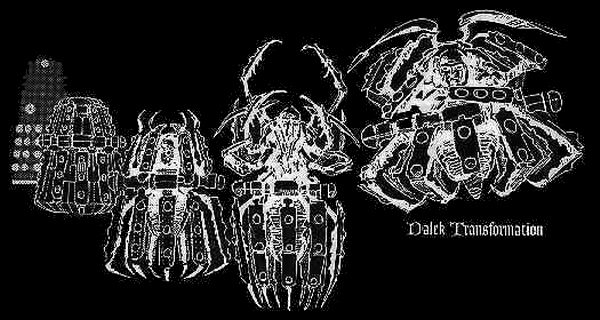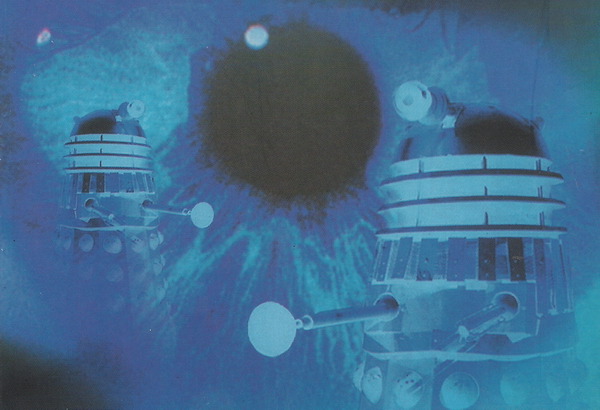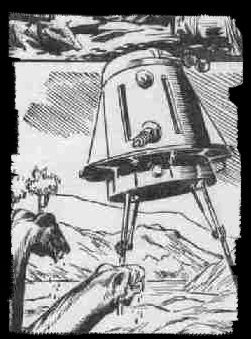|
| |
|
STORY PLACEMENT
THIS STORY TAKES NOVELS "GENOCIDE" AND "ALIEN BODIES."
WRITTEN BY JOHN PEEL
RECOMMENDED PURCHASE OFFICIAL BBC 'EIGHTH DOCTOR' PAPERBACK (ISBN 0-563-40573-2) RELEASED IN OCTOBER 1997.
BLURB the TARDIS is swept up by a garbage ship roving through space,
the Quetzel. approaches and takes the Quetzel by force, the Doctor discovers that he and Sam are not the only unwitting travellers on board - there is a strangely familiar survival pod in the hold. Delani, the captain of the second ship, orders the pod to be opened, AND The Doctor is powerless to intervene as THE MONSTROUS Davros is awakened once
again. Delani and his crew are Thals, the sworn enemies of the Daleks. The THALS intend to use Davros to wipe out the Daleks, But the Doctor is still worried.
For there is a signal beacon inside the pod, and even now a Dalek ship is closing in... |
|
|
War of the Daleks OCTOBER 1997
War of the Daleks is a book that I have very mixed feelings about. I want to hate it, for the reasons that I’ll detail below, but I just can’t. And why? Because, despite the flood of fundamental flaws that plague the second half of the novel, I always enjoy it. Thoroughly. Cover to cover. Every time. And I could happily read it again.
For starters, I don’t think the significance of having a full-length and wholly original Dalek story in print can be overstated. Whatever their reasons were, Virgin never did it, and consequently their exceptional range of Doctor Who books never felt quite… finished. BBC Books, however, were quick to cash-in on the popularity and downright notoriety of the Doctor’s oldest foes, though rather tellingly their subsequent appearances in original novels been sparse (to say the least).
But who better to baptise the Daleks in the medium than John Peel, author of perhaps the two most outstanding Target novelisations? Indeed, tearing through Peel’s novelisations of both second Doctor Dalek serials remains to this day one of my most fond memories of reading. Peel writes for the Daleks with such gusto that one can’t help but be drawn into his world… even if he isn’t necessarily pulling the strings in the direction that you want them to be pulled.
The first hundred and fifty pages or so of War of the Daleks are pure gold. The opening twenty-page prologue is particularly memorable; had these pages been published as a short story without the ensuing… um… perplexity, no doubt all of fandom would’ve been singing Peel’s praises rather than calling for his head. I gather that much of this prologue was inspired by or derived from designs produced for an early version of the Amblin TV Movie, and if this is true, then boy did we get a raw deal with the Fox TV Movie that we ended up with. The battle here between the Daleks and the Thals is not just your three standard issue Daleks versus a handful of red-shirted extras – we have squadrons of special weapons Daleks, spider Daleks, ‘strider’ Daleks (think ATAT Walkers), marine Daleks, red Daleks, blue Daleks… I could go on. Peel has such passion for and such knowledge of the Daleks that he is able to create on the page the kind of war that fans have dreamt of ever since 1963.
What’s more, War of the Daleks is, for the most part, a carefully structured and wonderfully paced novel and, better still, it does what very few of its contemporaries did in that it actually puts the reader in mind of the television series. Fair dues, the ambitious battles might have had to be scaled down for the small screen (three standard issue Daleks versus a handful of red-shirted extras, perhaps?), but in terms of the storytelling War of the Daleks is truly classic Doctor Who. It even adheres to the traditional four-episode format, with the novel divided up into four groups of chapters, each group prefaced by some sort of interlude. These interludes are, in of themselves, captivating little stories which will be of particular interest for die-hard fans. Movellans, Mechanoids and the Space Special Security Service Agency can all be seen to rear their respective heads at some point.
And whilst he won’t win any awards for his juddering prose, Peel certainly has an interesting story to tell. His title for the book makes no secret of his bold intentions – this is the war of the Daleks, the definite article. All the skirmishes that took place prior to this are as nothing compared to the all-out civil war that ravages Skaro towards the end of this tale. And he doesn’t stop there - the Thals have their part to play too. The war of the Daleks is far from self-contained.
I really like Peel’s portrayal of the eighth Doctor too. Free from agenda, he is every bit the dashing cavalier that we saw in the TV Movie, only with a little more fire in his belly – no doubt the result of being pitted against not only his oldest foes but also their repugnant creator. Many will no doubt jeer at yet another attractive young woman – Chayn – literally throwing herself at the Doctor, but I’m all for having the writers explore his romantic side. It’s all part of the eighth Doctor’s 19th century big-shirted poet charm.
The Thals are impressive here too, Ayaka above all, who leaves a lasting impression. I love how Peel depicts the Thals as being such ruthless and efficient killers. In their quest to destroy the evil of the Daleks, they have all but lost themselves, something that the author explores brilliantly through the Thal Captain, Delani, and his plans for the future of the Thal race.
criticisms usually levelled at this novel are entirely justifiable. As much as I hate to say it, everything goes to pot once Davros shows up – and I’m not just talking about the retcon, which I’ll come to in a moment. My main gripe here is that Davros is nothing more than a cipher for the plot; shockingly dull and immeasurably disappointing. To think that Peel could have used the printed word to allow us inside this truly intriguing character’s head, instead he wastes words trying to convince us that Imperial Daleks are Renegade Daleks and vice versa. I’m only embellishing very slightly when I say that this novel contains sentences as clumsy as “the Renegade Daleks – that is, those Daleks loyal to Davros – fought the Imperial Daleks – for the avoidance of doubt, those loyal to the Dalek Prime”. Why not just stick to the handles dolled out by Ben Aaronovitch and cut out 10,000 words?
Worse still is the retcon. Remember the Doctor tricking Davros into blowing up Skaro in Remembrance of the Daleks? Well that wasn’t Skaro, it was Antalin! Yes, everything that has happened in Davros’ life since Destiny of the Daleks has been part of a cunning plot hatched by the Dalek Prime to put an end to Davros and all the Daleks that follow him once and for all. Antalin was refurbished to look like Skaro and Davros planted there to be found in Destiny of the Daleks as part of the biggest rouse ever. Davros, and the Doctor for that matter, therefore thought that Antalin was Skaro. The rest of the story tells itself.
Now I liked the fact that the Doctor played a part in destroying Skaro. It added a wonderful ambivalence to the Doctor’s character that, at the time, he sorely needed. It also served to intensify the tragedy of Davros. To have it all undone is at best aggravating; at worst downright irreverent. I suppose that at least it happened in a book and not on television, meaning that the canonicity of this story is open to interpretation (though Dalek Caan’s dialogue in the relatively recent episode Daleks in Manhattan might suggest that Peel’s wacky theory stands, and that the ‘proper’ Skaro was in fact destroyed in the Last Great Time War much later.)
that War of the Daleks culminates in the ‘death’ of Davros; ostensibly, at least. Back in 1997 I really bought into the fan hype surrounding this point and fully expected to Davros to die irrecoverably here. Well he doesn’t. I don’t know why Peel went to the bother of putting Davros through a death that, on the face of it, seems so ultimate – particle dissolution – only to incorporate his get-out clause into the very same passage that sees Davros ‘die’. And of course, Davros inevitably returned from the dead once again, no doubt reconstituted by the very spider Dalek that executed him.
And so, on balance, War of the Daleks is a book that I have very mixed feelings about. I want to hate it for the reasons that I’ve detailed above, but I can’t because, for all my moaning, I haven’t enjoyed a book this much
in ages.
Despairingly brilliant.
|
|
|
Copyright © E.G. Wolverson 2009
E.G. Wolverson has asserted his right under the Copyright, Designs and Patents Act, 1988 to be identified as the author of this work. |
|
|
This novel is notorious for putting forward the mind-bogglingly fanciful theory that Skaro wasn’t destroyed in Remembrance of the Daleks - the Doctor had tricked Davros into destroying the planet Antalin, which both had believed was actually Skaro! To say that this bizarre theory hasn’t proved popular amongst fans would be understating things quite considerably, nevertheless when considering War of the Daleks’ place in the canon, it should be noted that Dalek Caan’s dialogue in the new series episode Daleks in Manhattan heavily implies that it was indeed Antalin that was destroyed in Remembrance of the Daleks, as Skaro apparently survived the classic series to be destroyed in the Time War. That said, one could of course argue that Caan was actually referring to the events of Remembrance of the Daleks as having been part of the Time War, or that the homeworld he refers to (he does not name it) was a subsequent Dalek settlement (after all, Gallifrey was destroyed in The Ancestor Cell only to be reborn and then destroyed again in the Time War), but then we’d be getting as bad as John Peel.
Further, in order to reconcile the events of this story with the audio drama Terror Firma, we must assume that Davros’ mental breakdown in that story was followed by some event that left him drifting through space in an escape pod, in almost preposterously similar circumstances to those that he found himself in at the end of Remembrance of the Daleks, with no memory of his previous encounter with the eighth Doctor (who for his part, also seems to have forgotten all about their prior meeting…)
It may come as consolation to some that the later novel Unnatural History suggests the under the influence of time-travelling voodoo cult Faction Paradox, the Doctor tricks the Daleks into tying their subjective history in such knots that it would eventually collapse in on itself…
|
|
|
Unless otherwise stated, all images on this site are copyrighted to the BBC and are used solely for promotional purposes. ‘Doctor Who’ is copyright © by the BBC. No copyright infringement is intended. |
|

.jpg)
.jpg)


 Sadly though,
many of the
Sadly though,
many of the 